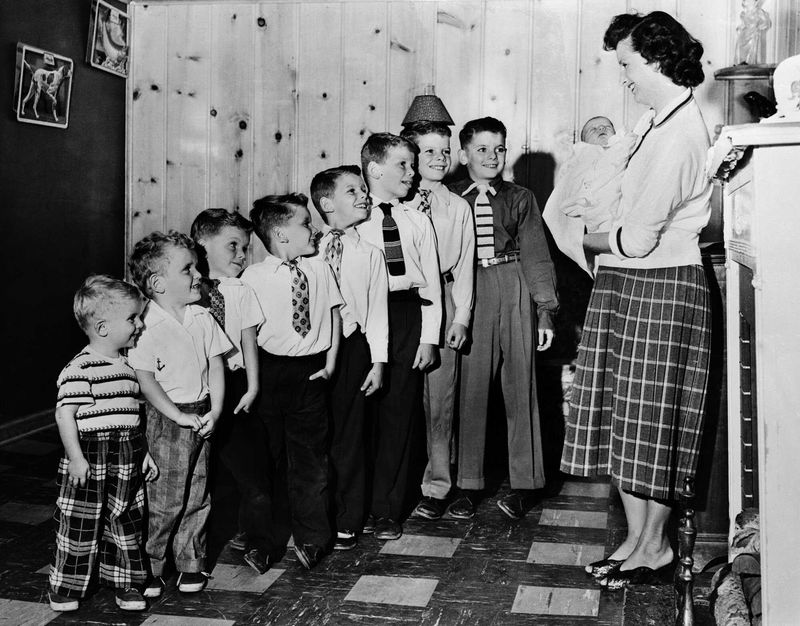Parenting rules are guidelines passed down through generations, aiming to raise well-rounded and successful children. However, some of these rules are outdated and may contribute to increased levels of stress, anxiety, and depression among kids today. It’s essential to reevaluate these parenting norms to foster a healthier environment for our children.
1. Children Should Be Seen, Not Heard

“Children should be seen, not heard” was once a common mantra in households. This rule implied children should stay quiet and reserved. Such a notion often stifled children’s voices, making them feel undervalued. When kids are not allowed to express themselves, they might feel isolated, leading to emotional distress.
Today’s understanding emphasizes the importance of encouraging children to speak their minds. Allowing them to express ideas and emotions fosters confidence. A child’s input should be valued, contributing to their self-worth.
It’s vital to shift from silence to open communication, where children feel heard and understood.
2. Spare the Rod, Spoil the Child

The saying “spare the rod, spoil the child” suggested corporal punishment was necessary for discipline. This belief often led to physical punishment, impacting children’s mental health.
Today, we know positive reinforcement and logical consequences are more effective. Physical discipline can lead to fear, resentment, and long-term emotional damage.
Raising well-behaved kids doesn’t require harsh measures. Encouraging good behavior through understanding and communication proves more beneficial. It’s crucial to replace physical punishment with empathetic approaches, nurturing children’s development in a loving environment.
3. Boys Don’t Cry

“Boys don’t cry” is an outdated notion that pressures boys to suppress emotions. This belief can cause emotional bottling, leading to mental health challenges later.
It’s important to teach boys that feeling and expressing emotions is normal. Encouraging emotional openness helps in developing empathy and emotional intelligence.
Boys should be allowed to express vulnerability without judgement. Supporting emotional expression can prevent the buildup of negative feelings and contribute to healthier emotional development.
4. Children Must Always Obey Adults

“Children must always obey adults” was a rule that discouraged questioning authority. While respect is important, blind obedience can lead children to ignore their own instincts.
Teaching kids to evaluate situations critically empowers them to make independent judgements. Encouraging respectful dialogue rather than unquestioned obedience is key.
Children should be taught to respect authority but also to trust their own insights. This balance fosters confidence and critical thinking skills, essential for personal growth.
5. Good Grades Matter Most

Placing undue pressure on kids to achieve good grades can lead to stress and anxiety. The “good grades matter most” rule overlooks other aspects of a child’s development.
Emphasizing holistic growth, including social skills and creativity, is crucial. Academic achievement is important, but it shouldn’t overshadow the development of other essential life skills.
Encouraging a balanced approach ensures children grow up well-rounded, confident, and capable of handling various life challenges.
6. Respect Is Never Earned, Only Given

The idea that “respect is never earned, only given” forced children to respect adults unconditionally. This can lead to relationships based on fear or obligation rather than mutual respect.
Teaching children that respect is earned through actions and character creates healthier dynamics. Encouraging respect based on mutual understanding promotes genuine connections.
Children should learn that respect is a two-way street. This understanding fosters relationships built on trust and integrity, essential for emotional well-being.
7. Emotions Should Be Hidden

The outdated rule that “emotions should be hidden” taught children to suppress their feelings, causing emotional bottling.
Expressing emotions is vital for emotional health. Teaching children to communicate their feelings openly fosters understanding and empathy.
Encouraging emotional expression helps children develop healthy coping mechanisms. This approach supports better mental health throughout life, reducing the risk of depression and anxiety.
8. Always Put Others First

Teaching children to “always put others first” can lead to neglecting their own needs and well-being. This rule can foster feelings of inadequacy and low self-esteem.
Encouraging children to balance self-care with caring for others is essential. Teaching them to prioritize their own needs helps them develop a healthy self-image.
Empowering kids to care for themselves while being empathetic towards others fosters balanced relationships and personal growth.
9. Early to Bed, Early to Rise

The rule “early to bed, early to rise” might not suit every child’s natural rhythm, potentially leading to sleep issues.
Understanding a child’s unique sleep needs is crucial. Allowing flexibility in sleep schedules supports better rest and overall health.
Promoting healthy sleep habits aligned with individual needs ensures children are well-rested and ready for learning and play.
10. It’s Just a Phase

Dismissing children’s challenges as “just a phase” trivializes their experiences. This rule might prevent kids from seeking help when needed.
Acknowledging a child’s feelings and experiences validates their emotions and encourages seeking support.
Understanding their perspective fosters trust and communication, ensuring children feel supported and heard.
11. Privacy is Not for Children

The belief that “privacy is not for children” can hinder their development of boundaries. Without privacy, children may feel controlled and lack personal space.
Respecting a child’s privacy teaches them about boundaries and trust. Acknowledging their need for space fosters independence and self-respect.
Encouraging privacy helps children understand personal boundaries, contributing to healthier relationships and self-esteem.
12. Never Question Authority

“Never question authority” discourages critical thinking and confidence. This rule can result in compliance without understanding.
Teaching children to question respectfully promotes intellectual growth. Encouraging curiosity helps children develop analytical skills.
Fostering an environment where questioning is welcomed builds confidence and nurtures independent thinking.
13. Winning is Everything

The notion that “winning is everything” places undue pressure on children. This belief can lead to anxiety and fear of failure.
Encouraging effort and learning from mistakes supports resilience and growth. Teaching kids that participation and growth matter more than winning fosters a positive mindset.
Promoting the value of effort over victory ensures children develop a healthy sense of self-worth.

